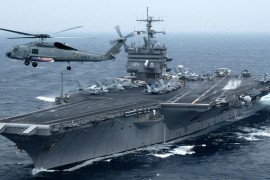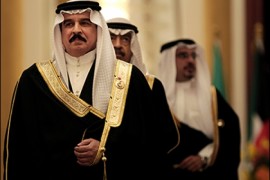While the ruling family in Bahrain views December 16 as a glorious national day worth celebrating, widespread sectors of the opposition celebrate martyrs day on December 17 every year. It is a matter of deep regret that the people of Bahrain do not see December 16 as an occasion unifying the various sectors of society, while it is supposed to be one of national unity, celebrations, and social brotherhood. The country loses muchbecause it does not find in the “National Day” a joyous occasion that enriches feelings of diligent, dynamic people who love their homeland like the Bahrainis.
December is classified as one of the restless months on the island of unmanageable compatibility. It was perhaps the most tense month of the year during the period between 1994 until 2010. It is still the month of intensified feelings, even after the period from mid-February to mid-March 2011 topped the scene.
If asked whether Bahrain was divided or not, or to what extent is this division, one can draw attention to what happens during this month(December) to see the depth of the division between the official authorities and large sectors of people. I will not write much about historyespecially that I am fond of the future. However, what happened in the past is important because it helps us understand the present and extrapolate the future.
On December 16 of each year, the government celebrates the day King Hamad acceded the throne and the National Day while it ignores the 14th of August, which is the day Bahrain was evacuated from the British colonisation in 1971.
December 16 reminds various sectors of the opposition of the tragedies experienced by the people of Bahrain. This particular year (2014) marks the twentieth anniversary to the martyrdom of Hani Khamis and Hani Al-Wasti, both were killed by Bahraini security by live ammunition inDecember 17, 1994, thereby inaugurating the 90s uprising, which demanded abiding by the 1973 Constitution, which was abolished by the King of Bahrain in 2002. The extensive mass demonstrations were preceded by numerous preliminary events including two petitions: an elitist and a people’s list, which was signed by thousands and ignored the regime, which remained violent, as usual, against its opponents.
Since 1994, December surpassed other months with its events especially because it proudly reminds people of the nineties uprising even if they differ now in their point of views. Examples include the former Minister Dr. Majeed Al-Alawi, who was one of the opposition leaders living overseas, Mansour Al-Jamri, editor Al Wasat newspaper, who was the spokesman for the Bahrain Freedom Movement, the most prominentpartisan façade influencing the course of events at the time, and Sheikh Ali Salman, who sparked the uprising. Salman was deported by the authorities in January 1995 together with Sheikh Hamza Al-Dairi and Syed Haidar Al-Sitri, in addition to those who chose the slogan of topplingthe regime in 2011, after their despair of the possibility of reform from within, most notably the trio Said Al-Shehabi, Hasan Mushaima and Abdul Wahab Hussain. These leaders might have different visions at present but they were collectively unified in demanding an activation of the 1973 constitution.
Personally, I am very saddened while I still search for an inclusive and agreed upon national day, where my kids and I can cheer Bahrain with tearsof joy, regardless of the name of the ruler and the extent of my agreement with his approach. Perhaps the search for a unified national day has become a matter of urgency and a suitable option might be August 14th, which will include all Bahrainis around the world.
The Bahraini opposition celebrates August 14 as day of independence, but it chooses to demonstrate and cut down streets to express its rejection ofthe ruling family policies. I hope the oppositions transforms August 14 to a happy carnival, where people celebrate by launching balloons, havingconcerts, singing national songs, and carrying the flags of Bahrain. This day marks the evacuation day and should emit happiness because it celebrates the departure of the British colonisation from Bahrain. Additionally, perhaps this celebration can attract some loyalists to a collectivelyagreed upon event. With great regret, however, the regime still views the British withdrawal as a wrong step by the British Government at the end of sixties of the last century, but it is not impossible to attract the Bahraini regime to mark the occasion in one way or another.
It is a misfortune for Bahrain that Shaikh Abdul Amir Al-Jamri, the leader of the nineties uprising, passed away on 18 December 2006. I personally think that Al-Jamri is the most prominent politician who is respected on a national scale unlike others, and I termed “the misfortune for Bahrain” because if he had passed away in a date other than December 18, the anniversary of his death would perhaps be a day of national unity.However, reviving this idea in one form or another such as choosing the day of his birth or any important day in his life would be suitable for national unity. (The anniversary of founding the National Union Committee in October 1954 might be suitable on a national scale, but unfortunately, the government sees this memory as painful).
What is important here is that December 16 and August 14 are not the only days marking a dispute on a national scale. February 14, for example, was one of the joyous national days in Bahrain marking the affirmative vote on the National Action Charter in 2001. A year later, the King of Bahrain chose to sabotage the positively unified anniversary and transformed it into a bad one when he issued the new constitution (The Constitution of the Kingdom of Bahrain 2002), which was different both in format and content.
After 11 years, February 14 (2011) was again transformed into a different, unusual memory in Bahrain: a bad and disastrous one for the regimebecause it marks the outbreak of the “February 14 revolution”. At the same time, it also marks a memory that was filled with hopes of change when tens of thousands of citizens gathered at the Pearl Roundabout. (Sadly, I think that we might not find an agreed upon place and or memorial site as well because the authorities destroyed the Pearl Roundabout because it marks a painful period for King Hamad, while the majority of citizens believe that the famous monument should be commemorated and preserved).
December 16 and the other events mentioned here reflect the depth of the crisis between the ruling family and the citizens. Furthermore, it nowappears that the regime is preparing to celebrate the National Day, and opposition is preparing to commemorate the martyrs who died in sake of freedom and equality. Perhaps new confrontations expected in the coming days will be more virulent especially that they are taking place after disagreed upon elections, are associated with important regional events, and are fueled by distressed people affected by the era of ongoing security.
No signs are evident indicating that the sharp Bahraini division is on its way to recovery in light of the unilateral approach of King Hamad, which is a clear failure in understanding the depth of differences and their risk to the regime and the country while various sectors are not yet capable of choosing a unified day in which everyone, including loyalists and the opposition, can celebrate their love for Bahrain




